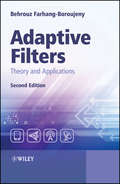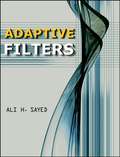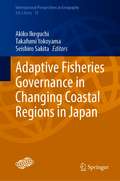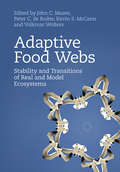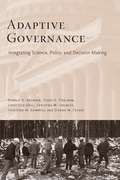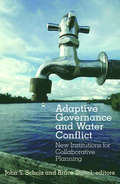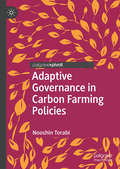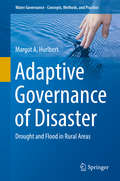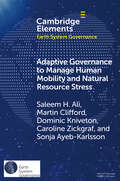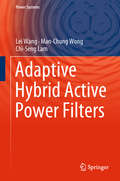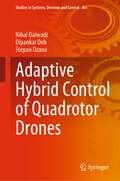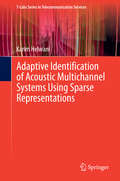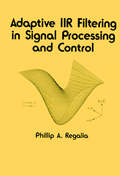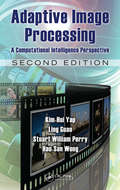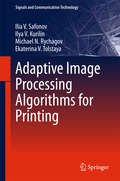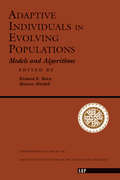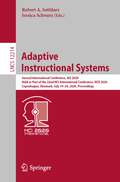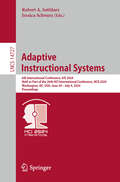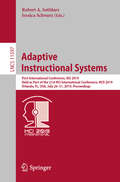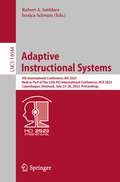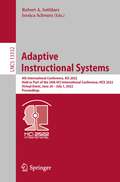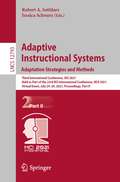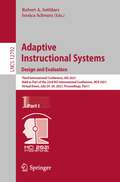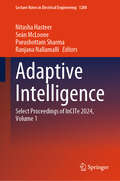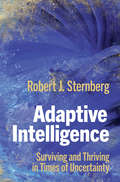- Table View
- List View
Adaptive Filters
by Behrouz Farhang-BoroujenyThis second edition of Adaptive Filters: Theory and Applications has been updated throughout to reflect the latest developments in this field; notably an increased coverage given to the practical applications of the theory to illustrate the much broader range of adaptive filters applications developed in recent years. The book offers an easy to understand approach to the theory and application of adaptive filters by clearly illustrating how the theory explained in the early chapters of the book is modified for the various applications discussed in detail in later chapters. This integrated approach makes the book a valuable resource for graduate students; and the inclusion of more advanced applications including antenna arrays and wireless communications makes it a suitable technical reference for engineers, practitioners and researchers. Key features:* Offers a thorough treatment of the theory of adaptive signal processing; incorporating new material on transform domain, frequency domain, subband adaptive filters, acoustic echo cancellation and active noise control.* Provides an in-depth study of applications which now includes extensive coverage of OFDM, MIMO and smart antennas.* Contains exercises and computer simulation problems at the end of each chapter.* Includes a new companion website hosting MATLAB® simulation programs which complement the theoretical analyses, enabling the reader to gain an in-depth understanding of the behaviours and properties of the various adaptive algorithms.
Adaptive Filters (Wiley - Ieee Ser.)
by Ali H. SayedAdaptive filtering is a topic of immense practical and theoretical value, having applications in areas ranging from digital and wireless communications to biomedical systems. This book enables readers to gain a gradual and solid introduction to the subject, its applications to a variety of topical problems, existing limitations, and extensions of current theories. The book consists of eleven parts?each part containing a series of focused lectures and ending with bibliographic comments, problems, and computer projects with MATLAB solutions.
Adaptive Fisheries Governance in Changing Coastal Regions in Japan (International Perspectives in Geography #13)
by Akiko Ikeguchi Takafumi Yokoyama Seishiro SakitaJapan’s fisheries sector is undergoing a major restructuring. The coastal ecological change and natural disasters such as tsunami demand that communities transform or organize resource governance anew. Under the national policy of decentralization to cope with the aging and declining population, the availability of local infrastructure, both physical and social, plays a significant role in the adaptive capacity of the community. This book presents the historical and spatial dynamics of coastal fisheries resource governance in response to different environmental changes, its socio-political context, and challenges raised by academicians. The reader will find the national trends and geographical patterns of the administrative restructuring in the communities and fisheries cooperatives from abundant maps and figures, as well as a rich description of adaptive governance in the scale of region and community by ecological-historical approaches. Comparative analysis of the communities provides a practical framework to understand a variety of local resources in Japan’s coastal regions, which will serve as a guide to the development of alternative adaptive governance in community-based small-scale fisheries in the world.
Adaptive Food Webs: Stability and Transitions of Real and Model Ecosystems
by Moore Mccann Peter C. Kevin S. John C. De Ruiter Volkmar WoltersPresenting new approaches to studying food webs, this book uses practical management and policy examples to demonstrate the theory behind ecosystem management decisions and the broader issue of sustainability. All the information that readers need to use food web analyses as a tool for understanding and quantifying transition processes is provided. Advancing the idea of food webs as complex adaptive systems, readers are challenged to rethink how changes in environmental conditions affect these systems. Beginning with the current state of thinking about community organisation, complexity and stability, the book moves on to focus on the traits of organisms, the adaptive nature of communities and their impacts on ecosystem function. The final section of the book addresses the applications to management and sustainability. By helping to understand the complexities of multispecies networks, this book provides insights into the evolution of organisms and the fate of ecosystems in a changing world.
Adaptive Governance: Integrating Science, Policy, and Decision Making
by Ronald Brunner Toddi Steelman Lindy Coe-Juell Christina Cromley Christine Edwards Donna TuckerDrawing on five detailed case studies from the American West, the authors explore and clarify how to expedite a transition toward adaptive governance and break the gridlock in natural resource policymaking. Unlike scientific management, which relies on science as the foundation for policies made through a central bureaucratic authority, adaptive governance integrates various types of knowledge and organizations. Adaptive governance relies on open decision-making processes recognizing multiple interests, community-based initiatives, and an integrative science in addition to traditional science. Case studies discussed include a program to protect endangered fish in the Colorado River with the active participation of water developers and environmentalists; a district ranger's innovative plan to manage national forestland in northern New Mexico; and how community-based forestry groups are affecting legislative change in Washington, D.C.
Adaptive Governance and Water Conflict: New Institutions for Collaborative Planning
by John T. Scholz Bruce StiftelWater policy seems in perpetual crisis. Increasingly, conflicts extend beyond the statutory authority, competence, geographical jurisdictions, and political constituencies of highly specialized governing authorities. While other books address specific policy approaches or the application of adaptive management strategies to specific problems, this is the first book to focus more broadly on adaptive governance, or the evolution of new institutions that attempt to resolve conflicts among competing authorities. Adaptive Governance and Water Conflict investigates new types of water conflicts among users in the seemingly water-rich Eastern United States. Eight case studies of water quality, water quantity, and habitat preservation or restoration in Florida were chosen to span the range of conflicts crossing fragmented regulatory boundaries. Each begins with a history of the conflict and then focuses on the innovative institutional arrangements - some successful, some not - that evolved to grapple with the resulting challenges. In the chapters that follow, scholars and practitioners in urban planning, political science, engineering, law, policy, administration, and geology offer different theoretical and experience-based perspectives on the cases. Together, they discuss five challenges that new institutions must overcome to develop sustainable solutions for water users: Who is to be involved in the policy process? How are they to interact? How is science to be used? How are users and the public to be made aware? How can solutions be made efficient and equitable? In its diverse perspectives and unique combination of theory, application, and analysis, Adaptive Governance and Water Conflict will be a valuable book for water professionals, policy scientists, students, and scholars in natural resource planning and management.
Adaptive Governance in Carbon Farming Policies
by Nooshin TorabiThis book discusses a variety of different perspectives involved in biodiversity management and bio-sequestration projects in Australia, working towards achieving adaptive governance in carbon farming. It not only examines landholders’ motivation but also the challenges of integrating biodiverse forests into the agricultural landscape. Drawing on the contrast between science and policy stakeholders’ views on carbon farming and the practical challenges of achieving adaptive governance, the book discusses the significant gap between theory and practice encountered in this field of study. The book suggests ways of improving the decision-making capacity of government officials and policymakers involved in managing carbon and biodiversity markets, as well as introducing measures to promote adaptive governance by engaging landholders in more effective land conservation. Climate change is a pressing issue on the global political agenda, and this book makes an important contribution to the ongoing debate. This book will be an invaluable reference for practitioners, policymakers and researchers interested in alternative forms of governance in natural resource management.
Adaptive Governance of Disaster: Drought and Flood in Rural Areas (Water Governance - Concepts, Methods, and Practice #First Edition)
by Margot A. HurlbertThis book provides a comparative analysis of policy instruments designed to respond to climate change, drought and floods in connection with agricultural producers and their communities in four case study areas: Alberta and Saskatchewan, Canada; Coquimbo, Chile; and Mendoza, Argentina. Assessed from the standpoint of effectiveness and adaptive governance, instruments for improving the livelihood capitals of agricultural producers are identified and recommendations to improve the suite of policy instruments are put forward.
Adaptive Governance to Manage Human Mobility and Natural Resource Stress (Elements in Earth System Governance)
by Saleem H. Ali Martin Clifford Dominic Kniveton Caroline Zickgraf Sonja Ayeb-KarlssonConnections between resources and migration operate as a complex adaptive system rather than being premised in linear, causal mechanisms. The systems thinking advocated within this Element increases the inclusion of socio-psychological, financial, demographic, environmental and political dimensions that mediate resource-(im)mobility pathways. The Earth Systems Governance paradigm provides a way to manage global migration flows more effectively, allowing for consideration of networks and interdependencies in addition to its inherent adaptiveness. Resource rushes, hydropower displacement, and climate-induced retreat from coastal areas are all examples of circumstances linking resources and human mobility. Movement can also ameliorate environmental conditions and hence close monitoring of impacts and policies which harness benefits of migration is advocated. Green remittance bonds, and land tenure policies favoring better arable resource usage are key ingredients of a more systems-oriented approach to managing mobility. The Global Compact on Migration offers an opportunity to operationalize such adaptive governance approaches in the Anthropocene.
Adaptive Hybrid Active Power Filters (Power Systems)
by Lei Wang Man-Chung Wong Chi-Seng LamThis book introduces advanced thyristor-based shunt hybrid active power filters (HAPFs) for power quality improvement in power grids, which are characterized by a low dc-link operating voltage and a wide compensation range. This means they can overcome the high dc-link voltage requirement of conventional active power filters and the narrow compensation range problem of LC-coupling hybrid active power filters. Consisting of 10 chapters, the book discusses the principle, design, control and hardware implementation of thyristor-based hybrid active power filters. It covers 1) V-I characteristics, cost analysis, power loss and reliability studies of different power filters; 2) mitigation of the harmonic injection technique for thyristor-controlled parts; 3) nonlinear pulse width modulation (PWM) control; 4) parameter design methods; 5) minimum inverter capacity design; 6) adaptive dc-link voltage control; 7) unbalanced control strategy; 8) selective compensation techniques; and 9) the hardware prototype design of thyristor-based HAPFs, verified by simulation and experimental results. It enables readers to gain an understanding of the basic power electronics techniques applied in power systems as well as the advanced techniques for controlling, implementing and designing advanced thyristor-based HAPFs.
Adaptive Hybrid Control of Quadrotor Drones (Studies in Systems, Decision and Control #461)
by Nihal Dalwadi Dipankar Deb Stepan OzanaThis book discusses the dynamics of a tail-sitter quadrotor and biplane quadrotor-type hybrid unmanned aerial vehicles (UAVs) and, based on it, various nonlinear controllers design like backstepping control (BSC), ITSMC (Integral Terminal Sliding Mode Control), and hybrid controller (BSC + ITSMC). It discusses single and multiple observer-based control strategies to handle external disturbances like wind gusts and estimate states. It covers the dynamics of slung load with a biplane quadrotor and a control architecture to handle the effect of partial rotor failure with wind gusts acting on it. An anti-swing control to prevent damage to the slung load and a deflecting surface-based total rotor failure compensation strategy to prevent damage to the biplane quadrotor are also discussed in this book. The monograph will be helpful for undergraduate and post-graduate students as well as researchers in their advanced studies.
Adaptive Identification of Acoustic Multichannel Systems Using Sparse Representations (T-Labs Series in Telecommunication Services)
by Karim HelwaniThis book treats the topic of extending the adaptive filtering theory in the context of massive multichannel systems by taking into account a priori knowledge of the underlying system or signal. The starting point is exploiting the sparseness in acoustic multichannel system in order to solve the non-uniqueness problem with an efficient algorithm for adaptive filtering that does not require any modification of the loudspeaker signals. The book discusses in detail the derivation of general sparse representations of acoustic MIMO systems in signal or system dependent transform domains. Efficient adaptive filtering algorithms in the transform domains are presented and the relation between the signal- and the system-based sparse representations is emphasized. Furthermore, the book presents a novel approach to spatially preprocess the loudspeaker signals in a full-duplex communication system. The idea of the preprocessing is to prevent the echoes from being captured by the microphone array in order to support the AEC system. The preprocessing stage is given as an exemplarily application of a novel unified framework for the synthesis of sound figures. Finally, a multichannel system for the acoustic echo suppression is presented that can be used as a postprocessing stage for removing residual echoes. As first of its kind, it extracts the near-end signal from the microphone signal with a distortionless constraint and without requiring a double-talk detector.
Adaptive IIR Filtering in Signal Processing and Control (Electrical Engineering and Electronics #90)
by Phillip RegaliaIntegrates rational approximation with adaptive filtering, providing viable, numerically reliable procedures for creating adaptive infinite impulse response (IIR) filters. The choice of filter structure to adapt, algorithm design and the approximation properties for each type of algorithm are also addressed. This work recasts the theory of adaptive IIR filters by concentrating on recursive lattice filters, freeing systems from the need for direct-form filters.;A solutions manual is available for instructors only. College or university bookstores may order five or more copies at a special student price which is available upon request.
Adaptive Image Processing: A Computational Intelligence Perspective, Second Edition (Image Processing Series)
by Kim-Hui Yap Ling Guan Stuart William Perry Hau San WongIllustrating essential aspects of adaptive image processing from a computational intelligence viewpoint, the second edition of Adaptive Image Processing: A Computational Intelligence Perspective provides an authoritative and detailed account of computational intelligence (CI) methods and algorithms for adaptive image processing in regularization, edge detection, and early vision. With three new chapters and updated information throughout, the new edition of this popular reference includes substantial new material that focuses on applications of advanced CI techniques in image processing applications. It introduces new concepts and frameworks that demonstrate how neural networks, support vector machines, fuzzy logic, and evolutionary algorithms can be used to address new challenges in image processing, including low-level image processing, visual content analysis, feature extraction, and pattern recognition. Emphasizing developments in state-of-the-art CI techniques, such as content-based image retrieval, this book continues to provide educators, students, researchers, engineers, and technical managers in visual information processing with the up-to-date understanding required to address contemporary challenges in image content processing and analysis.
Adaptive Image Processing Algorithms for Printing (Signals and Communication Technology)
by Ilia V. Safonov Ilya V. Kurilin Michael N. Rychagov Ekaterina V. TolstayaThis book presents essential algorithms for the image processing pipeline of photo-printers and accompanying software tools, offering an exposition of multiple image enhancement algorithms, smart aspect-ratio changing techniques for borderless printing and approaches for non-standard printing modes. All the techniques described are content-adaptive and operate in an automatic mode thanks to machine learning reasoning or ingenious heuristics. The first part includes algorithms, for example, red-eye correction and compression artefacts reduction, that can be applied in any photo processing application, while the second part focuses specifically on printing devices, e. g. eco-friendly and anaglyph printing. The majority of the techniques presented have a low computational complexity because they were initially designed for integration in system-on-chip. The book reflects the authors' practical experience in algorithm development for industrial R&D.
Adaptive Individuals In Evolving Populations: Models And Algorithms
by Richard K. BelewThis book is out of a workshop organized to address questions like these. The meeting was sponsored by the Santa Fe Institute and held at Sol y Sam- bra in Santa Fe, New Mexico, during July, 1993. It brought together a group of about 20 scientists from the disciplines of biology, psychology, and computer science, all studying interactions between the evolution of populations and individuals’ adaptations in those populations, and all of whom make some use of computational tools in their work.
Adaptive Instructional Systems: Second International Conference, AIS 2020, Held as Part of the 22nd HCI International Conference, HCII 2020, Copenhagen, Denmark, July 19–24, 2020, Proceedings (Lecture Notes in Computer Science #12214)
by Jessica Schwarz Robert A. SottilareThis volume constitutes the refereed proceedings of the Second International Conference on Adaptive Instructional Systems, AIS 2020, which was due to be held in July 2020 as part of HCI International 2020 in Copenhagen, Denmark. The conference was held virtually due to the COVID-19 pandemic.A total of 1439 papers and 238 posters have been accepted for publication in the HCII 2020 proceedings from a total of 6326 submissions. The 41 papers presented in this volume were organized in topical sections as follows: designing and developing adaptive instructional systems; learner modelling and methods of adaptation; evaluating the effectiveness of adaptive instructional systems.Chapter "Exploring Video Engagement in an Intelligent Tutoring System" is available open access under a Creative Commons Attribution 4.0 International License via link.springer.com.
Adaptive Instructional Systems: 6th International Conference, AIS 2024, Held as Part of the 26th HCI International Conference, HCII 2024, Washington, DC, USA, June 29–July 4, 2024, Proceedings (Lecture Notes in Computer Science #14727)
by Jessica Schwarz Robert A. SottilareThis book constitutes the refereed proceedings of 6th International Conference on Adaptive Instructional Systems, AIS 2024, held as part of the 26th International Conference, HCI International 2024, which took place in Washington, DC, USA, during June 29-July 4, 2024. The total of 1271 papers and 309 posters included in the HCII 2024 proceedings was carefully reviewed and selected from 5108 submissions. The HCII-AIS 2024 contributions have been organized in the following topical sections: Designing and developing adaptive instructional systems; adaptive learning experiences; AI in adaptive learning.
Adaptive Instructional Systems: First International Conference, AIS 2019, Held as Part of the 21st HCI International Conference, HCII 2019, Orlando, FL, USA, July 26–31, 2019, Proceedings (Lecture Notes in Computer Science #11597)
by Robert A. Sottilare Jessica SchwarzThis book constitutes the refereed proceedings of the First International Conference on Adaptive Instructional Systems, AIS 2019, held in July 2019 as part of HCI International 2019 in Orlando, FL, USA. HCII 2019 received a total of 5029 submissions, of which 1275 papers and 209 posters were accepted for publication after a careful reviewing process. The 50 papers presented in this volume are organized in topical sections named: Adaptive Instruction Design and Authoring, Interoperability and Standardization in Adaptive Instructional Systems, Instructional Theories in Adaptive Instruction, Learner Assessment and Modelling, AI in Adaptive Instructional Systems, Conversational Tutors.
Adaptive Instructional Systems: 5th International Conference, AIS 2023, Held as Part of the 25th HCI International Conference, HCII 2023, Copenhagen, Denmark, July 23–28, 2023, Proceedings (Lecture Notes in Computer Science #14044)
by Robert A. Sottilare Jessica SchwarzThis book constitutes the refereed proceedings of the 5th International Conference, AIS 2023, held as part of the 25th International Conference, HCI International 2023, which was held virtually in Copenhagen, Denmark in July 2023.The total of 1578 papers and 396 posters included in the HCII 2023 proceedings was carefully reviewed and selected from 7472 submissions. The AIS 2023 proceeding helps to understand the theory and enhance the state-of-practice for a set of technologies (tools and methods) called adaptive instructional systems (AIS). AIS are defined as artificially intelligent, computer-based systems that guide learning experiences by tailoring instruction and recommendations based on the goals, needs, preferences, and interests of each individual learner or team in the context of domain learning objectives.
Adaptive Instructional Systems: 4th International Conference, AIS 2022, Held as Part of the 24th HCI International Conference, HCII 2022, Virtual Event, June 26 – July 1, 2022, Proceedings (Lecture Notes in Computer Science #13332)
by Robert A. Sottilare Jessica SchwarzThis book constitutes the refereed proceedings of the 4th International Conference on Adaptive Instructional Systems, AIS 2022, held as part of the 23rd International Conference, HCI International 2022, which was held virtually in June/July 2022.The total of 1271 papers and 275 posters included in the HCII 2022 proceedings was carefully reviewed and selected from 5487 submissions. The AIS 2022 proceedings were organized in the following topical sections: Learner Modeling and State Assessment for Adaptive Instructional Decisions; Adaptation Design to Individual Learners and Teams; Design and Development of Adaptive Instructional Systems; Evaluating the Effectiveness of Adaptive Instructional Systems.
Adaptive Instructional Systems. Adaptation Strategies and Methods: Third International Conference, AIS 2021, Held as Part of the 23rd HCI International Conference, HCII 2021, Virtual Event, July 24–29, 2021, Proceedings, Part II (Lecture Notes in Computer Science #12793)
by Robert A. Sottilare Jessica SchwarzThis two-volume set LNCS 12774 and 12775 constitutes the refereed proceedings of the 12th International Conference on Social Computing and Social Media, SCSM 2021, held as part of the 23rd International Conference, HCI International 2021, which took place in July 2021. Due to COVID-19 pandemic the conference was held virtually. The total of 1276 papers and 241 poster papers included in the 39 HCII 2021 proceedings volumes was carefully reviewed and selected from 5222 submissions. The regular papers of AIS 2021, Part II, focus on Learner Modelling and State Assessment in AIS.
Adaptive Instructional Systems. Design and Evaluation: Third International Conference, AIS 2021, Held as Part of the 23rd HCI International Conference, HCII 2021, Virtual Event, July 24–29, 2021, Proceedings, Part I (Lecture Notes in Computer Science #12792)
by Jessica Schwarz Robert A. SottilareThis two-volume set LNCS 12792 and 12793 constitutes the refereed proceedings of the Third International Conference on Adaptive Instructional Systems, AIS 2021, held as Part of the 23rd International Conference, HCI International 2021, which took place in July 2021. Due to COVID-19 pandemic the conference was held virtually.The total of 1276 papers and 241 poster papers included in the 39 HCII 2021 proceedings volumes was carefully reviewed and selected from 5222 submissions. The regular papers of AIS 2021, Part I, are organized in topical sections named: Conceptual Models and Instructional Approaches for AIS; Designing and Developing AIS; Evaluation of AIS; Adaptation Strategies and Methods in AIS.
Adaptive Intelligence: Select Proceedings of InCITe 2024, Volume 1 (Lecture Notes in Electrical Engineering #1280)
by Nitasha Hasteer Seán McLoone Purushottam Sharma Ranjana NallamalliThis book comprises the select peer-reviewed proceedings of the 4th International Conference on Information Technology (InCITe-2024). It aims to provide a comprehensive knowledge base encompassing state-of-the-art research and development in adaptive intelligence, decision intelligence, artificial intelligence, deep learning, machine learning, data science, and enabling technologies for IoT, blockchain, and other futuristic technologies. It covers various topics that span cutting-edge, collaborative technologies and areas of computation. The content would serve as a rich knowledge repository on information & communication technologies, neural networks, fuzzy systems, natural language processing, data mining & warehousing, big data analytics, cloud computing, social networks, and intelligence, decision-making, and modeling, information systems, IT architectures, and security related aspects. This book provides a valuable resource for those in academia and industry.
Adaptive Intelligence: Surviving and Thriving in Times of Uncertainty
by Robert J. SternbergAdaptive Intelligence is a dramatic reappraisal and reframing of the concept of human intelligence. In a sweeping analysis, Robert J. Sternberg argues that we are using a fatally-flawed, outdated conception of intelligence; one which may promote technological advancement, but which has also accelerated climate change, pollution, the use of weaponry, and inequality. Instead of focusing on the narrow academic skills measured by standardized tests, societies should teach and assess adaptive intelligence, defined as the use of collective talent in service of the common good. This book describes why the outdated notion of intelligence persists, what adaptive intelligence is, and how it could lead humankind on a more positive path.
